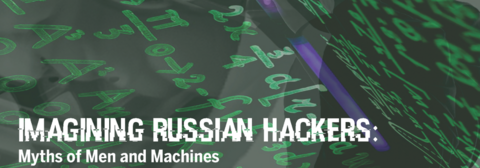Books
Biagioli, Mario, and Vincent Antonin Lépinay. From Russia with Code: Programming Migrations in Post-Soviet Times. Durham: Duke University Press, 2019.
Borenstein, Eliot. Plots against Russia: Conspiracy and Fantasy after Socialism. Ithaca, NY: Cornell University Press, 2019.
Buchanan, Ben. The Hacker and the State: Cyber Attacks and the New Normal of Geopolitics. Cambridge, MA: Harvard University Press, 2020.
Burkart, Patrick, and Tom McCourt. Why Hackers Win: Power and Disruption in the Network Society. Oakland, CA: University of California Press, 2019.
Jones, Matthew L. “Creating Uncertainty, Casting Doubt.” In Whistleblowing Nation: The History of National Security Disclosures and the Cult of State Secrecy, edited by Kaeten Mistry and Hannah Gurman, 243-70. New York: Columbia University Press, 2020.
Jamieson, Kathleen Hall. Cyberwar: How Russian Hackers and Trolls Helped Elect a President What We Don’t, Can’t, and Do Know. New York, NY: Oxford University Press, 2018.
Lipovetsky, Marc. Charms of the Cynical Reason: Tricksters in Soviet and Post-Soviet Culture. Academic Studies Press, 2010.
Popescu, Nicu, and Stanislav Secrieru, eds. Hacks, leaks and disruptions: Russian cyber strategies. N.p.: Challot Paper, 2018.
Rid, Thomas. Active Measures: The Secret History of Disinformation and Political Warfare. Farrar, Strauss, and Giroux: New York, 2020.
Soldatov, Andrei, and Irina Borogan. The Red Web: The Struggle between Russia’s Digital Dictators and the New Online Revolutionaries. New York: PublicAffairs, 2015.
Stoll, Clifford. The Cuckoo’s Egg: Tracking a Spy Through the Maze of Computer Espionage. N.p.: Doubleday, 1989.
Shimer, David. Rigged: America, Russia, and One Hundred Years of Covert Electoral Interference. William Collins, 2020.
Turovsky, Daniil. Vtorzhenie: Kratkai︠a︡ Istorii︠a︡ Russkikh Khakerov. Moscow: Individuum, 2019.
Wark, McKenzie. Capital Is Dead. Brooklyn: Verso, 2019.
Wark, McKenzie. A Hacker Manifesto. Harvard UP: Cambridge, 2004.
Woolley, Samuel C., and Philip N. Howard. Computational Propaganda: Political Parties, Politicians, and Political Manipulation on Social Media. New York, NY: Oxford University Press, 2019.
Zulkharneev, Albert and Yuliya Tseshkovskaya, ed. Global Internet Governance and Cyber Security: As viewed by russian experts. PIR PRESS, 2017. http://www.pircenter.org/en/static/global-internet-governance-and-cyber-security-as-viewed-by-russian-experts
Articles
Bozovic, Marijeta, and Benjamin Peters. “Hackers are Free People, Just Like Artists Who Wake Up in the Morning in a Good Mood and Start Painting.” Hack_Curio. https://hackcur.io/hackers-are-free-people-just-like-artists-who-wake-up….
Coleman, Gabriella. “The Public Interest Hack.” Limn, no. 8 (February 2017). https://limn.it/articles/the-public-interest-hack/.
Coleman, Gabriella, and Matt Goerzen. “Hacking Security.” Logic, no. 10 (May 4, 2020).
Dremliuga, Roman. “Subculture of Hackers in Russia.” Asian Social Science 10, no. 18 (August 22, 2014). https://doi.org/10.5539/ass.v10n18p158.
Holt, Thomas J., Deborah Strumsky, Olga Smirnova, and Max Kilger. “Examining the Social Networks of Malware Writers and Hackers.” International Journal of Cyber Criminology 6, no. 1 (2012).
Gavra, Dmitrii, and Pavel Slutskiy. “Trump, Mueller Investigation, and Alleged Russian Election Meddling: Russian Media Coverage in 2017-2019.” American Behavioral Scientist, December 8, 2020, 1-30. https://doi.org/10.1177/0002764220978455.
Hemmett, Julie. “Red Scares and Orange Mobilizations: A Critical Anthropological Perspective on the Russian Hacking Scandal.” Slavic Review 76 (Summer 2017): 66-80.
Karatgozianni, Athina. “Blame It on the Russians: Tracking the Portrayal of Russian Hackers during Cyber Conflict Incidents.” Digital Icons: Studies in Russian, Eurasian and Central European New Media, no. 4 (2010): 127-50.
McNeil, Leila. “Surely You’re a Creep, Mr. Feynman.” The Baffler. Last modified January 2019. https://thebaffler.com/outbursts/surely-youre-a-creep-mr-feynman-mcneill.
Nabeel, Fahad. “International Cyber Regime: A Comparative Analysis of the US-China-Russia Approaches”. Stratagem 1 (2), 8-27. 2019 https://journal.cscr.pk/stratagem/index.php/stratagem/article/view/22.
Peters, Benjamin. “Crackers and White-Hat Hackers.” Kulturaustausch, Summer 2018.
Remington, Thomas, Chris Spirito, Elena Chernenko, Oleg Demidov, and Vitaly Kabernik. Toward U.S.-Russia Bilateral Cooperation in the Sphere of Cybersecurity. Working Group on the Future of U.S.-Russia Relations. Volume 7. May 2016. https://us-russiafuture.org/publications/working-group-papers/toward-u-s-russia-bilateral-cooperation-in-the-sphere-of-cybersecurity/
Roebke, Joshua. “Scoundrels, Saints, and the Fiction of Individual Genius.” Undark. Last modified October 22, 2020. https://undark.org/2020/10/22/the-fiction-of-individual-genius/.
Shpeer, Maria E., and William T. Howe. “Exotic Beauty, Mail-order Bride, Secret Agent: The Stereotyped Experiences of Russian Women Immigrating to the United States.” Russian Journal of Communication 12, no. 3 (September 1, 2020): 306-22. https://doi.org/10.1080/19409419.2020.1851115.
Simonova, Aleksandra. “Coworking Environments: The Hackerspace and The Skolkovo Innovative City in Moscow” in From Russia With Code, the edited volume, ed. Biagioli M., Lepinay V. Duke University press. 2019.
Simonova, Aleksandra. “Cultural Analysis of startup Entrepreneurship in Russia: a Case study of a Moscow Hackerspace” in Laboratorium: Russian Review of Social Research; Saint-Petersburg, 10 (1), 51-78. 2018.
Stevens, T. “Cyberweapons: power and the governance of the invisible.” International Politics 55, 482–502 (2018). https://doi.org/10.1057/s41311-017-0088-y
News Articles
Barrett, Brian. “Alleged Russian Hacker Behind $100 Million Evil Corp Indicted.” Wired. Last modified December 5, 2019. https://www.wired.com/story/alleged-russian-hacker-evil-corp-indicted/.
Graff, Garrett M. “Inside the Hunt for Russia’s Most Notorious Hacker.” Wired. Last modified March 21, 2017.
Hastings, Michael. “Hack: Confessions of a Presidential Campaign Reporter.” GQ. Last modified October 1, 2008. https://www.gq.com/story/michael-hastings-newsweek-presidential-campaign?printable=true.
Hautala, Laura. “Russian hacking tool gets extra stealthy to target US, European computers.” CNET. Last modified November 20, 2018. https://www.cnet.com/news/new-russian-hacking-tool-gets-extra-stealthy-t….
Johnson, Kevin. “Two Russian hackers charged in theft of $70 million; described as ‘most prolific cybercriminals’ in a decade.” USA Today. Last modified December 5, 2019. https://www.usatoday.com/story/news/politics/2019/12/05/two-russian-hackers-charged-thefts-totaling-70-million/2618437001/.
Koerner, Bredan I. “From Russia with LØPHT.” Legal Affairs. Last modified May 2020. https://www.legalaffairs.org/issues/May-June-2002/feature_koerner_mayjun….
Krebs, Brian. “Why So Many Top Hackers Hail from Russia.” Krebs on Security. Last modified June 22, 2017. https://krebsonsecurity.com/2017/06/why-so-many-top-hackers-hail-from-ru….
Starks, Tim. “Big Russian hacker indictment yields deeper comprehension.” Politico. Last modified December 6, 2019. https://www.politico.com/newsletters/morning-cybersecurity/2019/12/06/bi….
Tufekci, Zeynep. “Who Needs the Russians?” The Atlantic. Last modified February 4, 2020. https://www.theatlantic.com/technology/archive/2020/02/bad-app-not-russians-plunged-iowa-into-chaos/606052/.
Multimedia
Agents Of Chaos. Directed by Alex Gibney and Javier Alberto Botero. HBO Documentary Films, 2020.
Turovsky, Daniil. “All You Need to Know about Russian Hackers.” Lecture presented at Woodrow Wilson Center, Washington DC, January 12, 2018. Woodrow Wilson Center. https://www.wilsoncenter.org/event/all-you-need-to-know-about-russian-ha….
